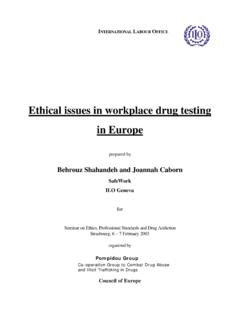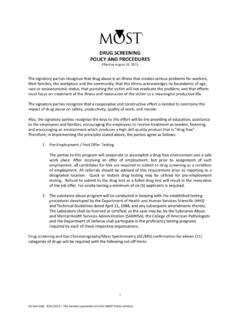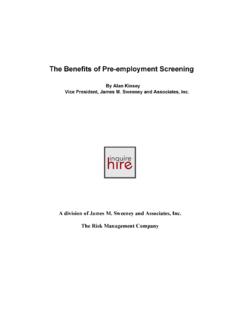Transcription of Workplace Drug and Alcohol Testing Laws. - …
1 August 2016 UpdateState-by-State Legal Status GuideWorkplace drug and Alcohol Testing American Association for Clinical Chemistry (AACC) Blood Alcohol content (BAC) Blood Alcohol test (BAT) Clinical Laboratory Improvement Amendments (CLIA) College of American Pathologists (CAP) Department of Transportation (DOT) Employee assistance program (EAP) Food and drug Administration (FDA) Forensic Urine drug Testing (FUDT) Gas Chromatography Mass Spectrometry (GC-MS) Medical review officer (MRO) National Highway Traffic Safety Administration (NHTSA) National Institute on drug Abuse (NIDA) Point of care Testing (POCT) Substance Abuse and Mental Health Administration (SAMHSA) Unemployment compensation (UC) Workers compensation (WC)Alere Toxicology has retained the services of Current Consulting Group, LLC (publisher of The On-Line Ultimate Guide to State drug Testing laws at ), to research and present the information contained in this guide.
2 This guide and the information contained herein is provided for informational purposes only. Neither Alere Toxicology nor Current Consulting Group, LLC, are law firms, and no attorneys were employed or consulted in the compilation and presentation of the information contained in this guide. This guide is not intended as a substitute for the legal advice of an attorney or that of a drug - Testing expert, knowledgeable of the user s individual circumstances. Alere Toxicology and Current Consulting Group, LLC encourage users to consult with an attorney or a drug Testing expert prior to finalizing any drug - Testing policy decisions based, in part or in whole, on the information contained in this guide. Users of this guide should be aware that legislative, regulatory, and case law developments regularly impact and can change the legal status of drug Testing on a state-by-state basis.
3 As such, Alere Toxicology and Current Consulting Group, LLC, make no claim as to the accuracy of the information found in this guide. Alere Toxicology and Current Consulting Group, LLC, are not responsible for the use of the information contained in this guide by readers, either individually or collectively. Compliance with state drug - and Alcohol - Testing legal requirements is the sole responsibility of the individual user of this guide as well as that of the entity he or she may represent or to whom he or she may provide drug AND Alcohol STATE-BY-STATE LEGAL STATUS GUIDEThis document provides an overview of the status and procedural requirements for drug and Alcohol Testing from state to state. Several types of law govern drug and Alcohol Testing . Mandatory laws lay out requirements for any employer in that state who conducts Testing .
4 Voluntary laws provide requirements only for an employer who elects to participate in the voluntary law in order to receive a benefit, such as limited legal protection. If an employer chooses not to participate, it is not affected by the voluntary law requirements. Voluntary state laws are marked as such in this document; otherwise a state law is mandatory. Brief notes are provided at the end of each state summarizing workers compensation and unemployment compensation laws as they relate to drug and Alcohol Testing . Any requirements for workers and unemployment compensation apply only when Testing is used to deny benefits and are usually separate from the mandatory or voluntary Workplace Testing law in a given TOXICOLOGY: STATE LEGAL STATUS FOR Workplace drug AND Alcohol Testing | 1 Legal status for Workplace drug and Alcohol testingArea of focusStatusCommentsSetting/circumstanceD efinedThe following types of Testing are required with conditions: pre-employment, periodic, follow-up and for cause.
5 Return-to-duty, post-accident and random permitted, but not tested (panel)DefinedAmphetamines, cannabinoids, phencyclidine, methadone, opiates, cocaine, methaqualone, barbiturates, benzodiazepines, propoxyphene, or a metabolite of any of these permittedDefinedBroadly defined: tissue, blood, breath, urine, or other product of the human body capable of revealing the presence of drugs or their metabolites or of screening devicesProhibitedPermitted outside this voluntary law but not by companies that wish to qualify for the WC testingPermittedMust comply with DOT standards; positive equals .04 for safety-sensitive jobs, .08 for all other CommentsEmployers must provide either an EAP or information about how to access EAP-type laboratoryRequiredSAMHSA- or CAP-certified labs premium discountPermittedWhen compliant with law qualifies for 5% claim denial or reductionPermittedRefer to ALA Code 25-5-51 (2006).
6 Requires compliance with 49 CFR part 40 drug and Alcohol Testing denialPermittedRefer to ALA Code 25-4-78 (Supp. 2005). Requires compliance with 49 CFR part 40 drug and Alcohol Testing regulations or equivalent has a voluntary drug Testing law. For companies that wish to qualify for a 5% discount on their workers compensation premiums they must comply with this law; other companies are not mandated to comply with this statute. THIS CHART REFLECTS THE REQUIREMENTS OF THE VOLUNTARY CODE 25-5-330 to 25-5-340 (2000)ALABAMA CODE 480-5-6-1 to .04 (1996)2 | THE FOLLOWING INFORMATION IS NOT OFFERED AS LEGAL ADVICE, BUT IS INSTEAD FOR INFORMATIONAL PURPOSES. Legal status for Workplace drug and Alcohol testingALASKAA laska has a voluntary drug Testing law. For companies that wish to qualify for limited legal protections they must comply with this law; other companies are not mandated to comply with this statute.
7 THIS CHART REFLECTS THE REQUIREMENTS OF THE VOLUNTARY STATUTES - of focusStatusCommentsSetting/circumstanceD efinedPermitted in all circumstances. However, if Testing is conducted, it must be done among all employees, including management. As well, pre-employment Testing must be post-offer. Random Testing is limited to safety-sensitive positions per case law. Post-accident is limited to those believed to have contributed to causing the tested (panel)DefinedDrugs with SAMHSA-established cut-off levels at a minimum. See Alaska Statutes Title 11, Chapter 71 for a list of controlled substances included in the state s definition of drugs. Notice of other drugs to be tested for and their cut-off levels must be given to donors in permittedDefinedUrine or breath screening devicesPermittedFDA-cleared devices only; many conditions apply; positives must be confirmed with GC-MS; written record of result must be provided to testingPermittedPermitted for employees; not permitted for MentionedCertified laboratoryRequiredWhen not using on-site kits lab must be certified by SAMHSA, CAP, American Assn.
8 Of Clinical premium discountNot MentionedWC claim denial or reductionPermittedRefer to Alaska Statute denialPermittedRefer to Alaska Statutes Requires compliance with voluntary TOXICOLOGY: STATE LEGAL STATUS FOR Workplace drug AND Alcohol Testing | 3 Legal status for Workplace drug and Alcohol testingARIZONAA rizona has a voluntary drug Testing law. For companies that wish to qualify for limited legal protections they must comply with this law; other companies are not mandated to comply. THIS CHART REFLECTS THE REQUIREMENTS OF THE VOLUNTARY REV. STAT. ANN. 23-493 TO (1995 & SUPP. 2005)(TITLE 23, CHAPTER 2, ARTICLE 14)Alaska has a voluntary drug Testing law. For companies that wish to qualify for limited legal protections they must comply with this law; other companies are not mandated to comply with this statute.
9 THIS CHART REFLECTS THE REQUIREMENTS OF THE VOLUNTARY of focusStatusCommentsSetting/circumstanceD efinedPermitted in all circumstances. If Testing is conducted, it must be done among all employees, including management. Post-accident Testing is only permitted immediately after event and of those suspected of causing the accident. Drugs tested (panel)DefinedAny substance considered unlawful under the schedules of the controlled substances section of the Comprehensive drug Abuse Prevention and Control Act of 1970 ( 91-513; 84 Stat. 1247; 21 United States Code section 812) or the metabolite of the permittedDefinedUrine, blood, hair, saliva, breath or other body screening devicesSee CommentsEven though the law expressly requires drug Testing to be done in a laboratory, it contains a clause stating that nothing in the statute shall be construed to encourage, discourage, restrict, limit, prohibit or require on-site drug Testing or Alcohol impairment Testing .
10 ( E) Alcohol testingPermittedPermitted; .08 or above is positive by a scientifically accepted method. EAPNot MentionedCertified laboratoryRequiredSAMHSA, CAP or Arizona Dept. of Health premium discountNot MentionedWC claim denial or reductionProhibitedArizona Revised Statutes Annotated 23-1021 was ruled unconstitutional by the AZ Supreme Court in Grammatico v. The Industrial denialPermittedRefer to Arizona Revised Statutes ; requires employer to conduct drug and Alcohol Testing in compliance with the guidelines of the voluntary law (Title 23, chapter 2, article 14).4 | THE FOLLOWING INFORMATION IS NOT OFFERED AS LEGAL ADVICE, BUT IS INSTEAD FOR INFORMATIONAL PURPOSES. Legal status for Workplace drug and Alcohol testingARKANSASA rkansas has a voluntary drug Testing law.







